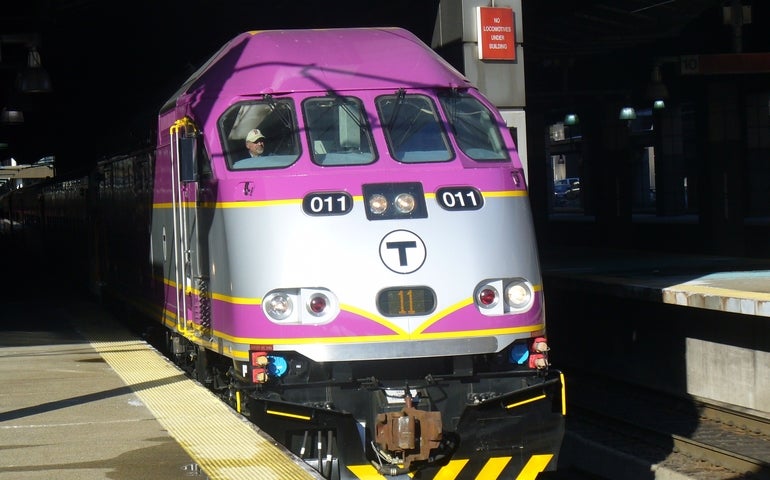Senate to tackle transportation with borrowing, not taxes
 Photo | Courtesy | MassDOT
An MBTA commuter rail train
Photo | Courtesy | MassDOT
An MBTA commuter rail train
The Senate will not take up a House-approved, half billion-dollar package of transportation tax and fee increases this lawmaking session, instead focusing attention on an omnibus borrowing bill that the Senate's Transportation Committee chairman believes can be fully funded without new revenues.
Sen. Joe Boncore, who like House Speaker Robert DeLeo lives in Winthrop, told the News Service that the $16.9 billion transportation bond bill that will hit the Senate floor next week will be the only major legislation his branch considers on that topic before the July 31 end of formal sessions for 2020.
The borrowing bill addresses the Senate's main policy and capital spending goals for transportation, Boncore said, adding that the multibillion-dollar budget shortfalls created by the COVID-19 pandemic pushed any tax hikes this year off the table.
"This COVID crisis has created a really unpredictable revenue situation for the commonwealth, and it's shifted, I think, the conversation from a discussion that was isolated to transportation improvement to a broader debate on what the state needs as a whole for revenue going forward," Boncore said.
"When the long-term economic outlook becomes clear and we can better assess what the state needs as a whole, post-COVID, then we can begin the conversation again about what revenues we'll need," he added.
The Senate's decision effectively kills any chances of final action in the 2019-2020 session toward generating new funding from transportation sources -- which would have included the first state gas tax increases since 2013 -- and directing it toward an aging transit system, suffocating congestion and crumbling infrastructure.
If they still wish to pursue more transportation revenue, an area that had been one of the most high-profile topics on Beacon Hill until the virus hit, lawmakers must start the process again from scratch next year.
One day before it approved its own version of an $18 billion borrowing bill in March, the House passed a bill authorizing hikes to the state's gasoline and diesel taxes, corporate minimum excise tax and ride-hailing fees as well as applying the sales tax to purchase of rental cars.
Democratic leaders at the time projected the increases would generate $522 million to $612 million per year in revenue , though their bill did not prescribe how to spend all of that additional money.
The legislation had been developed behind closed doors for months and ultimately passed 113-40.
While criticizing the Senate's unsuccessful attempts to increase road and bridge repair funding without a parallel revenue boost, House Speaker Robert DeLeo said last month he does not believe the tax and fee hikes can wait.
"I don't think we can take a year off in terms of paying attention to this issue," DeLeo said. "Most importantly, as part of the House bill, we had a mechanism, we took the tough vote, in terms of making sure there was financing to back up exactly what we did."
After the Senate's proposed borrowing bill (S 2813) cleared its Ways and Means Committee on Friday, lawmakers scheduled it for a July 16 formal session.
The legislation would authorize $16.9 billion in borrowing to be directed to a range of road, bridge and public transit investments, though Boncore said the bottom line could grow via amendments on the floor.
Many of the largest figures mirror what the House approved, including $5.6 billion for federal highway system projects and $695 million for the Green Line Extension project. The Senate version increased funding for non-federally aided highways $250 million over the House version to $2 billion and added another $25 million to the South Coast Rail expansion, bringing the project's total funding in the bill to $850 million.
The MBTA would receive $3.26 billion, plus a $300 million direct capital transfer under the Senate's bill.
In March, the House Ways and Means Committee prepared a $14.5 billion version of a transportation bond bill that increased to about $18 billion through amendments. Gov. Charlie Baker also proposed a roughly $18 billion version of a multi-year transportation borrowing bill with similar levels of capital investment.
House leaders argued in the spring that the governor's suggestion called for too much borrowing and spending and that the money "isn't fully there" to support it without more revenue.
Asked if the state could afford a minimum of $16.9 billion in borrowing over the next several years without additional revenue as the Senate suggested, Boncore answered, "absolutely."
"The conversation on revenue -- it's just not applicable to capital budgets," he said. "We did a very similar bond bill five years ago at $14 billion, and since then, revenues generally have grown over 20 percent. That more than compensates for the needs of this transportation bond bill."
Debt service payments on long-term capital spending are made out of the state's operating budget, and the dynamics around that budget have been shaken by the pandemic, the economic shutdowns it forced, and estimates that state tax collections will fall by billions of dollars, making big investments a lot more unlikely.
The Senate's bond bill also includes a number of policy changes, some of which had been previously supported by the House and governor and some of which would be new steps for the Legislature.
Under the bill, the MBTA would be able to pay capital worker salaries from bond sources instead of from operating funds, a change T officials have been pushing for to free up resources and lessen pressure on the budget.
The Senate included language imposing new data-collection requirements on ride-hailing companies such as Uber and Lyft and decriminalizing fare evasion on the MBTA, both of which Baker proposed in separate pieces of legislation.
Boncore said the Senate and governor "see eye to eye" on the importance of reducing punishments for failure to pay a public transit fare.
The new bond bill also orders the state Department of Transportation to implement a means-tested fare option on both regional transit authorities and the MBTA by 2022. Transportation leaders have been exploring a similar idea, but the Senate proposal sets a firm statutory deadline for low-income fares to become a reality.
MassDOT would also need to study deploying a mileage-based revenue system, where drivers pay based on how much distance they drive rather than based on the use of specifically tolled roads. A separate commission would study and make recommendations about the adoption of "regionally equitable roadway pricing and congestion pricing mechanisms."
Senate President Karen Spilka, an Ashland Democrat whose region relies on the tolled Massachusetts Turnpike, has pushed for more highways that currently are not tolled to impose charges on drivers as a way of fairly distributing costs.
In addition, cities and towns would gain authorization to embrace regional ballot initiatives under the Senate bill, effectively opening the gates for communities to propose and adopt their own taxes and fees aimed at funding transportation needs.
Boncore said that the Senate's bond bill and many other pieces of legislation have been refracted "through a special lens dealing with racial justice" following widespread protests against police brutality and systemic racism. The bill highlights equity issues by decriminalizing fare evasion and prioritizing low-income fares, he said.
"With the ridership being so depleted in the COVID crisis, how people are going to return to work, who the customers are -- we're going to be dealing with, not just on the core system of the MBTA but on the commuter rail system, that could look very different post-COVID," Boncore said. "We want to address and ensure that all people have access in an equitable way to public transportation."
Lawmakers face a tight timeline to finalize a transportation borrowing bill. After July 31, they cannot take any recorded roll call votes, which renders almost all major legislation that may draw opposition impossible.
Baker has pushed for billions in borrowing to fund transportation capital projects, but his views on proposals such as mandatory low-income fares or congestion pricing are less clear.
If Democratic leaders that hold supermajorities in both branches want to guarantee passage of any of those pieces, they would need to get the bill to Baker with at least 10 days before the end of sessions so they could have a chance to override a potential gubernatorial veto.
That veto-proof deadline falls around July 20, which would leave the House and Senate only a few days to complete private negotiations on a final version once the Senate approves its bill.
"We have no choice but to reach a compromise on a bond bill because it funds our major transportation infrastructure for the next five years," Boncore said. "We know what that state of disrepair number is, and it's growing every day we don't we don't do something."








0 Comments